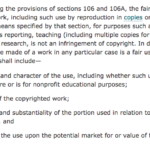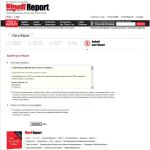
Interesting Tidbits From FTC’s Antitrust Win Against 1-800 Contacts’ Keyword Ad Restrictions
Over the course of about a decade starting in 2004, 1-800 Contacts entered into over a dozen settlement agreements with competitors, most of which mutually restricted both parties from buying keyword ads triggered to their competitor’s trademarks and sometimes requiring…

YouTube Defeats Defamation Claim in ‘Remove-and-Relocate’ Case–Bartholomew v. YouTube
YouTube has been sued numerous times for “removing-and-relocating” videos it thinks were promoted by spam. When it does a remove-and-relocate, YouTube takes down the video, discloses at the original URL that “This video has been removed because its content violated YouTube’s…

Court Rejects Gossip Site’s Fair Use Defense–Barcroft v. Coed Media
This is a copyright lawsuit by owners of celebrity photos against a gossip and entertainment website. It’s noteworthy because it went to trial and the plaintiffs prevailed, but the damage award is modest. The court finds that plaintiffs owns or validly…

First Circuit Rejects Copyright Workaround to Section 230–Small Justice v. Ripoff Report
[It’s impossible to blog about Section 230 without reminding you that it remains highly imperiled.] Goren runs a law firm, Small Justice. DuPont, a defendant in a case Goren brought, posted two negative reviews about Goren to Ripoff Report. Goren sued DuPont, who…
Hyperlinking to Sources Can Help Defeat Defamation Claims–Adelson v. Harris
An activist group posted an online petition urging then-Presidential candidate Mitt Romney to reject Nevada billionaire Sheldon Adelson’s campaign contribution. The petition linked to an AP story, which in turn linked to a court filing alleging that Adelson OKed his hotel empire…

App Listening For Audio Beacons May Be Illegal Wiretapping–Rackemann v. Colts
This is a lawsuit against the Colts and app developers, alleging that the Colts’ app activates a device’s microphone and temporarily records portions of audio, for advertising purposes. The app monitors the audio for “beacon tones” which are then used…

Nigerians Phish a B2B Transaction & Steal $736k. Who Bears the Loss?–Beau Townsend Ford v. Don Hinds Ford
This case could be a law school exam. Beau Townsend Ford (the seller) was looking to unload Ford Explorers in bulk. Their sales guy connects with a person at Don Hinds Ford (the buyer). They had transacted with each other…

Ninth Circuit Blesses Amazon’s Terms of Service
Plaintiff appealed from a district court order granting Amazon’s motion to compel arbitration based on an arbitration clause in its “Conditions of Use.” My blog post on the trial court ruling: “Court Enforces Arbitration Clause in Amazon’s Terms of Service–Fagerstrom…

No “Contract By Tweet” for Plaintiff Who Pitches Movie Idea via Social Media
This is an idea theft case based on the idea behind “Creed” the movie, a spinoff of the famous Rocky movies. Jarrett Alexander alleged that he came up with the idea for Creed, drafted the screenplay, and put together a…
Catching Up on Ninth Circuit CFAA Jurisprudence (Internet Law Casebook Excerpt)
[Eric’s note: this is another excerpt from my Internet Law casebook. Venkat and I couldn’t blog last year’s chaotic and messy Ninth Circuit’s CFAA jurisprudence in real time. I nevertheless took one for the team and tried to make sense of the…
